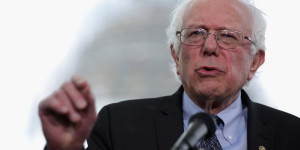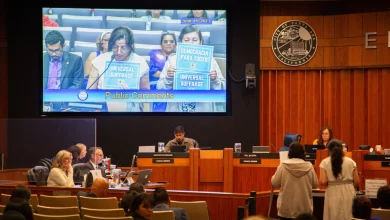
It may seem on the surface to be an irony, although not surprising, that there is confusion among socialist and communist forces about the sudden popularity of the self-proclaimed democratic-socialist Bernie Sanders in his bid for the Democratic Party presidential nomination for the 2016 election.
The confusion is not so much about how to politically characterize Sanders himself. As Eli Stephens and others have written, Sanders’ definition of “democratic socialism” is akin to the social-democratic models of the capitalist countries in northern Europe. Also, the term “democratic socialist” is well-understood in bourgeois circles to mean “not communist,” not a supporter of the Soviet Union or Cuba, and not a revolutionary.
So it is not the political characterization but the question of tactics that have led to confusion. How should radical or revolutionary socialists approach the Sanders campaign? More importantly, how can their orientation impact the millions of people who have been brought into political life, many for the first time, in support of someone who defines himself as a socialist?
Like all political phenomena, the Sanders campaign has contradictory features. Revolutionary people advocating for the revival and popularization of socialism need to evaluate their tactics in light of the fundamental or primary contradiction of the Sanders campaign. What is it?
On the one hand, the Sanders campaign has suddenly elevated the issue of socialism as an issue and topic of discussion for millions of his grassroots supporters who are not yet socialists themselves. Since anti-communist ideology has reigned supreme as the unofficial religion of the United States for the last 70 years, that has to be considered a very good thing.
On the other hand, Sanders is not a revolutionary socialist but rather an advocate for progressive reforms within capitalism, and he is not an anti-imperialist. In fact, he wrongly defines socialism, equating it with all public institutions, such as libraries, fire departments and even the police. His record in the U.S. Senate shows that he functions as a traditional liberal politician and not a radical internationalist when it comes to U.S. foreign policy.
What is the primary side of the contradiction?
Which side of this contradiction is primary? That millions of people are now talking about socialism without fear of reprisal and the hysteria that has dominated American political life for three generations? Or is it that Sanders is misleading people about what “real socialism” stands for?
This is the source of confusion, or what I think is actually the mis-leadership in tactics of some of the more radical socialist groups and individuals. Many of these people are well-intentioned and some consider themselves “revolutionaries,” although that label can only be verified in the heat of battles yet to come.
The Party for Socialism and Liberation believes that the fundamental or primary side of the contradiction that socialists need to emphasize is the vast opportunity created by the explosive growth and surprising popularity of the Sanders campaign.
In the very first question posed in the Democratic Party televised debate, a debate watched by millions of people, Sanders was asked:
COOPER: Senator Sanders. A Gallup poll says half the country would not put a socialist in the White House. You call yourself a democratic socialist. How can any kind of socialist win a general election in the United States?
SANDERS: Well, we’re gonna win because first, we’re gonna explain what democratic socialism is. And what democratic socialism is about is saying that it is immoral and wrong that the top one-tenth of 1 percent in this country own almost 90 percent—almost—own almost as much wealth as the bottom 90 percent. That it is wrong, today, in a rigged economy, that 57 percent of all new income is going to the top 1 percent. That when you look around the world, you see every other major country providing health care to all people as a right, except the United States. … ”
That he had to open the TV debate to explain why socialism wasn’t so unpopular that he could never win the general election did not hurt Sanders. In fact, starting right at that moment and over the next few hours, more than 44,000 individuals sent small on-line donations to his campaign (averaging about $31 per donation) for a total of $1.3 million.
It also led to an increase in the interest in socialism. During the debate, a Merriam-Webster editor tweeted, “‘Socialism’ spiking off the charts @MerriamWebster. #DemDebate.” Meaning, an unprecedented number of people were looking up the definition of “socialism” on the Merriam-Webster website.
Sanders was featured on the front cover of Time magazine. The photo showed a smiling, friendly appearing elderly man, Sanders is 73, and the headline read: “Socialize this, America.”
Tactics: Reaching Sanders’ supporters
Millions of people are hearing about “socialism” in a non-demonized way for the first time. This offers an immense opportunity for socialists to popularize socialism in the general public. Millions of people are for the first time in their lives wondering whether socialism might be valid even if they don’t yet know fully what it means or is.
Yet some radical socialists have emphasized in their agitation how “bad” Sanders is on some issues, or that he is not a “real socialist.”
That is not the best way to reach the millions of new Sanders supporters who for the first time in their lives want a “democratic socialist” to become president of the United States.
Our tactics and our agitation must be aimed at the Sanders supporters. As Sanders gets more visibility, more people who until now never heard of him, will support his message. For many, it is their first step in supporting a political campaign that is connected in any way to “socialism.” It is the enthusiasm and devotion to the campaign by millions of grassroots people that has allowed Sanders to become a national phenomenon even though the capitalist-owned media wrote him off as a fringe candidate just a few months ago. He doesn’t get corporate funding. It is hundreds of thousands people sending him small donations that has allowed him to keep up with Clinton.
The National Nurses United is the only national labor union to openly endorse Sanders so far. But support for Sanders is growing among rank-and-file workers in many unions as well as more left-wing organizers and militants.
Sanders, stunning the capitalist political establishment, has been drawing far and away the largest and most enthusiastic crowds of any candidate, Democrat or Republican—28,000 in Portland Ore., 27,000 in Los Angeles, 15,000 in Seattle, more than 10,000 each in Wisconsin and Arizona, and 8,000 in Dallas. Thousands more have packed convention centers and auditoriums in Louisiana, Colorado, Vermont, Iowa and other states.
The role of anti-communism in politics
Historical context is necessary to appreciate the significance of this. We don’t mean ancient history but the history of the past 70 years—since 1945.
Not just radical socialists and revolutionary communists but even the most moderate socialists have been forced to swim in a very small pond since the brutal ascension of anti-communism as the country’s unofficial religion 70 years ago virtually destroyed the socialist left. Not only was the left censored from above but leftists self-censored and didn’t talk about socialism on the job with their co-workers, their neighbors, and even their families. People didn’t want to get fired or risk social isolation. Socialism became a dirty word. And as such, the ideas of socialism were cast as deeply negative and forced into a nearly underground existence in the “Free World.”
The Communist Party, which had 100,000 members at the end of World War II, was declared illegal by the U.S. Congress. The top leaders of the CP were sent to prison for being traitors. The United States labor movement was purged of leftists. Anti-communist loyalty oaths were a requirement for employment. Thousands of communists and socialists went into exile and fled the United States. In Hollywood and in academia, progressive, left and socialist personalities were blacklisted. The House Un-American Activities Committee subpoenaed people from every walk of life and demanded that they renounce socialism and “name names” of people who may have signed a petition for peace, in opposition to nuclear weapons, for peaceful relations with the Soviet Union. Martin Luther King Jr. and every other civil rights leader who emerged in the 1950s and 1960s was condemned by J. Edgar Hoover and the FBI as being puppets of communist agitators.
Socialism and communism were purged from “American” politics. Its history textbooks scandalized and defamed socialism. The left was purged not only from present politics but from American history, leaving several generations with ignorance or hatred of socialism. Instead of celebrating International Working Women’s Day we had Mother’s Day. Mayday became Law and Order Day.
The impact of anti-communism for the last 70 years in the United States should not be underestimated. Not only was the left censored, but it learned as a matter of survival to engage in self-censorship. To learn more about this process, see Abby Martin’s recent 28-minute episode from the Empire Files.
The role of tactics
Now the pond has suddenly got bigger. Millions of people are now supporting someone who calls himself a socialist. Socialism, it turns out, is not that scary to them. That’s something new and its importance must be grasped.
Does it really make sense tactically for more radical socialists, at this moment and under these circumstances, to emphasize that Sanders “isn’t really a socialist”? Or that Sanders is just a big fraud and this entire mass outpouring is just a clever “sheepdogging” manipulation by the Democratic Party designed to keep the more progressive part of the population voting Democrat in 2016.
Does it make any tactical sense, if you want to truly popularize socialism with the millions of new Sanders supporters who are supporting him precisely because they want change and see a “socialist” candidate as the vehicle for change, that they are just really wasting their time or worse.?
No, it does not make sense. Perhaps it is a psychological fear by small fish who have been comfortably swimming in small ponds for so long that they fear the scary waves and powerful currents of larger bodies of water or simply being swallowed up by the bigger fish. Or, in the case of some very militant and radical young people who are unfamiliar with the crushing suppression of the socialist and communist left in the U.S., they are understandably turned off by and not seeing past Sanders’ liberalism.
Again, we need to emphasize with them that the issue isn’t about Sanders the person but about the new opportunity that has arisen to reach millions of people who are just thinking about socialism in a positive way for the first time. Bourgeois politics is highly personalized and focuses attention on the individual candidate. People make judgments on the individual candidate: Are they bad or good or even great? Socialist tactics reject this method. A tactical orientation should be based on the larger political trends, opportunities and challenges.
Ruling class fears a renewal of anti-capitalist militancy
The ruling class wants the Sanders campaign to be diminished not because he is a dangerous revolutionary socialist, which he is not, but because his campaign is starting to legitimize a broader discussion of what’s wrong with the U.S. economic system and to generate enthusiasm for socialism even if the term is still vague and not well understood.
This campaign comes just three years after U.S. law-enforcement agencies arrested 7,000 people and broke up their encampments in public places. “We are the 99%” caught on like wildfire. It scared the hell out of the bankers, and the government went into mobilization mode, sending its cops to break up the movement. It was not because the Occupy Movement was a revolutionary danger to the capitalist elites. It was a peaceful and loosely organized protest movement. But the ruling class was alarmed that any radical expression against Wall Street’s devastating war against the people can quickly morph into a genuinely revolutionary movement that does threaten their power. The FBI and Homeland Security sprang into action and in coordination with local police departments carried out a nationwide crackdown that snuffed out the Occupy movement. For all their talk about democracy, the U.S. capitalist establishment really fears that any expression of real democracy, in the streets or even in the electoral arena, will lead to a new wave of radical and revolutionary struggle similar to what happened in the 1930s or 1960s.
Sanders is walking a fine line. The unexpected wave of mass enthusiasm and support he has generated is due to his powerful rhetoric against Wall Street greed, inequality and poverty. But to be even mildly tolerated by the centers of the capitalist establishment, he sends other signals that he is not really a radical.
Sanders pledges he won’t run as an independent
Sanders is running as a Democrat even though he officially is identified as an independent in the Senate. He said that he could never stand a chance of winning the general election unless he ran as a Democrat. He has also promised to support whomever the Democratic Party finally selects as its candidate for the 2016 presidential election. He vows that he will not run as an independent candidate if he doesn’t win the Democratic nomination, because, he asserts, that would split the Democratic Party vote and allow the right-wing Republican candidate to win the White House. Given how racist, anti-women and anti-immigrant the Republican candidates are, this will make sense to many of his supporters.
But there will also be many Sanders supporters who will not want to support Hillary Clinton or Joe Biden or any other representative of the Democratic Party establishment entirely enmeshed with Wall Street, the most powerful corporate elites, the NSA, and the Military-Industrial Complex. They will want Sanders to run as an independent and break from the Democrats if he doesn’t win the nomination. They are not supporting Sanders because he is a Democrat but because he is running on a progressive platform that is far to the left of the other politicians. But, come August 2016, if Sanders has failed in his bid he promises to do what Jesse Jackson did in 1984 and 1988. That is, to fold his progressive tent and tell his followers to vote for the establishment Democratic Party candidates so as to prevent the Republicans from capturing the White House.
This is the dilemma created for leftists by the carefully constructed political system in the United States. In a parliamentary system, such as exists in most of the capitalist countries, Sanders could run independently from the Democrats and in competition with the Democrats and still win a sizable part of the general vote and a significant number of parliamentary seats. Any combination of parties and factions that combine to constitute a majority in parliament then select the head of state.
But in the U.S. system, it is winner take all. Thus, the “logic” of lesser-evil politics is reinforced. If the Democratic Party loses, then the even more right-wing Republicans take hold of the government. Most leftist and progressive people end up voting for the Democrats out of fear that the Republicans will even more greatly eviscerate the rights of the people. U.S. electoral politics, by virtue of how the system is constructed, therefore leaves a fundamentally narrow field for radical socialist and revolutionary politics. And yet, it is precisely in the electoral arena, that “socialism” is being revived in the United States after its decades of near-underground or small-pond existence.
PSL’s socialist presidential campaign’s approach to the Sanders supporters
The PSL has its own election campaign with Gloria La Riva and Eugene Puryear running for president and vice-president. The campaign has a 10-point program. It is clearly more far reaching than the Sanders campaign program, and unlike Sanders’ program it is consistently anti-imperialist.
Of course, we will point out all the political differences that we have with the Sanders campaign. We are in complete solidarity with the Palestinian people and their right to be self-determining rather than living under brutal occupation, for instance. Also, Sanders wants a carefully crafted and cautiously used drone program, but the PSL condemns the Pentagon drone program because it constitutes a war crime and reflects the criminal nature of U.S. imperialism. The PSL does not want the Wall Street banks to be more regulated, as Sanders proposes, but rather seized as criminal enterprises. The top bankers’ greed and avarice has made millions of people jobless, thrown millions from their homes, and impoverished a vast swath of the population so that a small cabal of billionaires become richer still. They should be identified as the biggest criminals in the country and punished as such. The PSL is campaigning to make a job or an income a constitutional right and to make health care, childcare services, and education entirely free.
The PSL presidential campaign is distinctive from Sanders’ campaign. But instead of attacking Sanders campaign as a fraud or not “real socialism,” we want to reach out to the grassroots supporters of the Sanders campaign and let them know that we, like them, want real change. We want to emphasize that socialism is much better than capitalism and use the space to have meaningful, friendly and persuasive discussions about what socialism is and how it can work. We lose nothing by acknowledging that the Sanders campaign and the work of its volunteers and supporters have made a major contribution to helping popularize socialism in this the center of world capitalism where the system’s thought police thought they had successfully snuffed out socialism once and for all.
Finally, what else can supporters of the PSL’s Gloria La Riva and Eugene Puryear’s presidential election campaign say to Sanders supporters? We can point out why they should not follow Sanders’ advice when he tells his supporters that they should ultimately back any other Democratic Party nominee in the event that Sanders doesn’t win the nomination. We should argue that Bernie Sanders’ program for guaranteed health care, college education and other major reforms is what’s important and if Sanders is truly serious about winning these reforms, he should run as an independent. Millions of people are excited about his campaign. If the ruling class succeeds in installing Clinton or some other “acceptable” pro-Wall Street candidate instead of Sanders, however, why should his supporters be told to back a political candidate who has no intention of implementing such needed reforms. If Sanders ran as an independent candidate for president, as a “democratic socialist,” he would receive the votes of millions of people. That would be something really significant in creating a new political dynamic in the United States.
If Sanders, now with the backing of millions of people, ran as an independent, that would put him on a collision course with the Democratic Party establishment. We can point out that the Democratic Party, even when it controlled both the White House and both houses of Congress in 2009 and 2010, refused to pass single-payer health care or comprehensive immigration reform or relief for staggering student debt. The Democrats, when they were completely in charge, refused to implement any of the reforms Sanders is advocating. Instead, the Democratic Party leadership chose to bail out Wall Street bankers with taxpayers’ money while millions of working families were evicted from their homes by the very same bankers. The Democratic Party is not the vehicle for the desperately needed changes that Sanders is advocating. It is a ruling-class party completely under the control of the biggest banks and corporations.
If Bernie Sanders chooses to run as a political independent, that would enrage the capitalist leaders of the Democratic Party. He would be condemned by the political establishment, which would demonize and red bait him to no end. Sanders has pledged that he won’t run as an independent, but his supporters should demand it. If he ends up backing the Democratic Party establishment candidate, his supporters should stay true to the fight and vote for socialist and truly progressive candidates in 2016.






